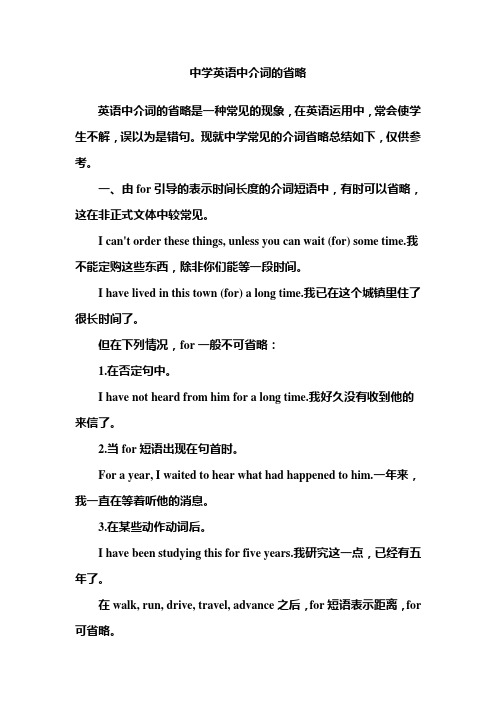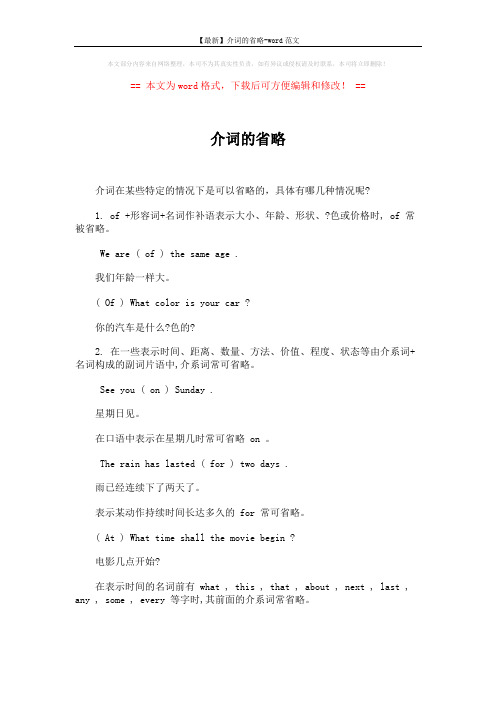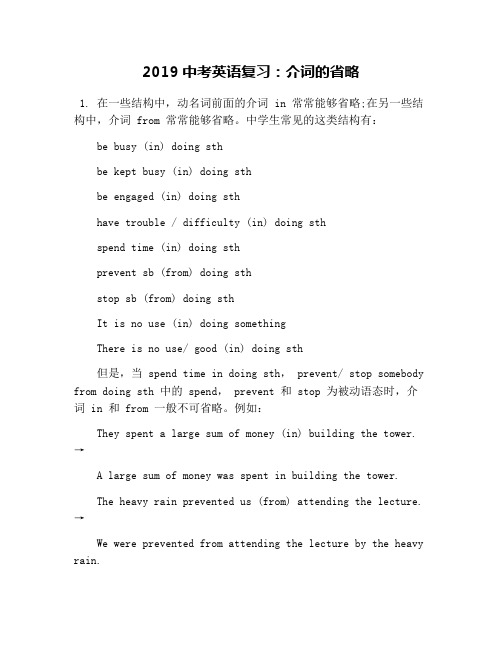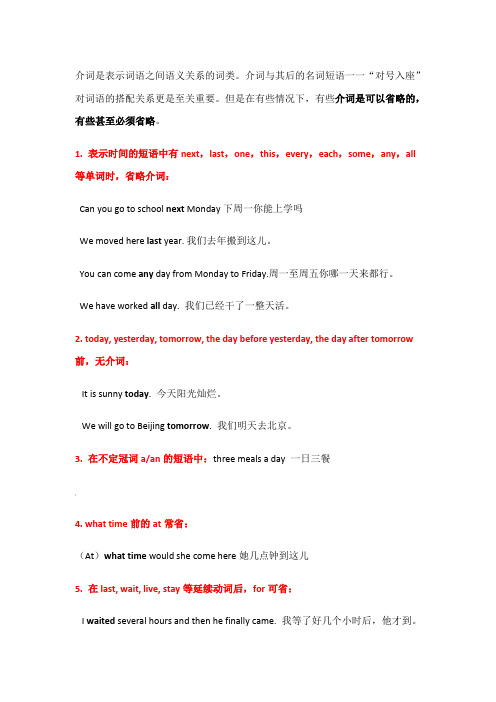英语中省略介词的七种常见情形doc
英语不用介词或省略介词的几种情况

英语不用介词或省略介词的几种情况英语中有时不用介词,有时可以省略一些介词,这也是我们学习英语时需要注意的问题。
一、时间名词前不用介词的情况1.在含有this,that,last,next 的时间短语前,不用介词。
如:We are going to plant potatoes this year. 今年我们打算种土豆。
I won’t do it next time. 我下次不会干了。
2.含有不定代词some, every, each, one 等的时间短语前不用介词。
如:Some day you’ll regret what you said. 将来有一天你会后悔你所说的话。
They come here for their holidays every summer 他们每年夏天来这儿度假。
3. 在today, yesterday, the day before yesterday , tomorrow, the day after tomorrow 等词或词组前不用介词。
如:Where did you go yesterday? 昨天你去哪儿了?I met her the day before yesterday. 我前天见过他。
4. 以副词all 开头的时间段之前,不用介词。
如:They have lived in Beijing all the time. 他们一直住在北京。
The earth moves around the sun all day and all might .地球日夜不停地绕着太阳运转。
注:时间段之前的介词for 可有可无。
如:I have been here (for) two days. 我来这儿有两天了。
We have stayed here (for) three months. 我们在这儿住了三个月。
二、v-ing前介词的省略1. be busy (in) doing... 忙于做某事。
省略介词的七种情

总结词
诗意、音乐感
要点二
详细描述
在文学创作和诗歌中,为了追求语言的诗意和音乐感,作者 常常会省略某些介词。这种省略使得语言更加含蓄、富有想 象空间。例如,在诗歌中,“She sings the song of love” (她唱着爱的歌)中省略了“with”。
应用三:新闻报道与学术论文
总结词
04
省略介词的注意事项
注意事项一:避免引起歧义
总结词
在省略介词时,应尽量避免产生歧义, 以免影响句子的意思表达。
详细描述
在某些情况下,省略介词可能会使句 子结构变得模糊,导致读者对句子的 理解产生歧义。因此,在省略介词时, 应确保句子的意思清晰明确,避免产 生不必要的误解。
注意事项二:遵循语法规则
在一些固定搭配中,介词也可能会被 省略,如“dream of (about)”中的 “of”被省略。
情况二:在并列句中省略介词
在并列句中,如果两个或多个句子结构相似,介词可能会被省略以避免重复。例 如,“I like apples and (I like) oranges”中省略了“I like”。
在这个例子中,“at which”被省略 ,但仍然能够清晰表达句子的意思。
THANKS
感谢观看
准确、严谨
详细描述
在新闻报道和学术论文中,语言要求准确、严谨,因此介 词的使用通常较为规范,但有时为了使句子结构紧凑或简 化表达,也会适当省略某些介词。例如,“The study found that most people prefer to travel by plane” (研究发现大多数人更喜欢乘飞机旅行)中省略了“on”。
。
并列句中省略介词的情况需要注 意上下文语境,避免产生歧义。
英语中几种常用省略的用法总结

英语中几种常用省略的用法总结省略在英语语言的应用非常广泛,其中有很多常用的省略用法。
下面总结一下以往常见的一些省略形式:一、表示未表达完整的缩写1、单字缩写。
如: is,>’s; has,>’s; have,>’ve;I,>I’m; he,>he’s; she,>she’s; do,>do’s;does,>does’s; am,>am’s2、多字缩写。
如:are not,>aren’t; cannot,>can’t; do not,>don’t; will not,>won’t; have not,>haven’t; would not,>wouldn’t; could not,>couldn’t; shouldnot,>shouldn’t; it is,>it’s; that is,>that’s; there is,>there’s二、表示不完整词组的省略1、定语从句中的省略。
如:(1) All the students (who are) present here are eager to study.(2) This is the reason (why) he decided to quit his job.2、表示概念的省略。
如:(1) TV and radio (programmes).(2) To do more exercise (is beneficial to your health).三、表示句子成分的省略1、宾语的省略。
如:(1) I like to read (books).(2) He gave me an answer (to my question).2、表语的省略。
如:(1) He is a teacher (of English).(2) The weather today is (very) hot.3、主语的省略。
中学英语中介词的省略

中学英语中介词的省略英语中介词的省略是一种常见的现象,在英语运用中,常会使学生不解,误以为是错句。
现就中学常见的介词省略总结如下,仅供参考。
一、由for引导的表示时间长度的介词短语中,有时可以省略,这在非正式文体中较常见。
I can't order these things, unless you can wait (for) some time.我不能定购这些东西,除非你们能等一段时间。
I have lived in this town (for) a long time.我已在这个城镇里住了很长时间了。
但在下列情况,for一般不可省略:1.在否定句中。
I have not heard from him for a long time.我好久没有收到他的来信了。
2.当for短语出现在句首时。
For a year, I waited to hear what had happened to him.一年来,我一直在等着听他的消息。
3.在某些动作动词后。
I have been studying this for five years.我研究这一点,已经有五年了。
在walk, run, drive, travel, advance之后,for短语表示距离,for 可省略。
They traveled (for) twenty miles and then stopped for the night.他们走了二十英里,然后停下来过夜。
二、of的省略。
1. of在与age, size, colour, height, shape, weight, use等名词构成介词短语时往往可以省略。
Mr. Smith has a son (of) my age.史密斯先生有个儿子和我同龄。
2. of +形容词+名词作表语,of可省略。
She is (of) the same weight as her mother.她和她的母亲一样重。
英语中的省略现象

英语中的省略现象在英语中,为了避免重复,句子中的某些部分经常省略,给考生的理解增加了困难。
在近几年的NMET中,省略现象十分常见,为帮助考生更好地迎战高考,现对省略现象总结如下:一、并列复合句中某些相同成分的省略。
1. This beeper works well,but that one doesn餿 (work well).这个寻呼机工作正常,但那个就不行。
2. All uranium atoms do not have the same atomic weight. Some of them weigh 234 units,some (of them) (weigh) 235 units,and some (of them) (weigh) 238 units.ニ有的铀原子并非都有相同的原子量。
其中有的重234,有的重235,而有的重238。
二、在when,while,if,as if,though(或although),as,until,once,wheth er,unless,where等连词连接的状语从句中,常省略跟主句相同的主语和be动词。
1. When (water is) pure,water is a colorless liquid.水纯净时,是无色的液体。
2. When (I am) in trouble I always turn to her for help.我困难时总是找她帮助。
3. Errors,if any,should be corrected.如果有什么错误,就应当改正。
(if后省略了there are)4. Wood gives much smoke while (wood is) burning.木头燃烧时,它放出很多烟。
5. The letter is to be left here until (it is) called for.这封信留在这里待领。
初中英语中省略介词的10种常见情形

初中英语中省略介词的10种常见情形,听说过吗?在英语中,介词很多,出现的频率很高。
但我们发现,在一些时候,本来需要用介词,可却没有用,或可用可不用时就不用了,这就是介词被省略的现象。
这种现象是英语中大家约定俗成的,符合英语表达的习惯。
今天我们来总结一下,英语中介词省略的情形。
. 1.当表时间的名词或名词词组被last, next, this, that, every, any等修饰时,与它们搭配的介词(in, on, at等)常常省略。
You may ask me for help (at) any time.. 你任何时候都可以请我帮忙。
. I Will see you next week.. We all worked hard last year.. They are arriving this Friday afternoon..当in this way ,in the way, in that way三个短语中的介词in可省略。
on’t look at me (in) that way.不要那样看着我。
I’ve learned a lot (in) that way.3. spend time, have difficulty (trouble, a hard time)+in + doing 结构中的介词in 常省略。
I spent the whole afternoon (in) practicing the song.Mr.Yang has trouble (in) listening.We used to have a hard time (in) living in the city .4. 忙于做某事be busy in doing sth. 中的in 可以省略。
All students in our school are busy (in) preparing for the speech. 我们学校的所有学生都在忙于准备演讲。
省略介词的几种情况

省略介词的几种情况一、时间介词on的省略。
凡符合以下几种情况的时间介词on,都必须省略。
1.在today,yesterday,tomorrow以及the day before yesterday,the dayafter tomorrow之前。
例如:I shall see him today.我今天要去看他。
She had her operation the day before yesterday.她前天动了手术。
2.在含有this,that,next,last的时间词组之前。
例如:Why didn't you go to school this morning?今天早上你为什么没去上学?He stayed with us last week.上周他和我们在一起。
I didn't feel well that week.那个星期我有点不舒服。
We are meeting next Tuesday.我们下周二会面。
3.在含有one,any,each,every,some,all的时间词组之前。
例如:Let's have a party one evening next week.我们下周某个晚上聚会一次吧。
You can come any day.你随便哪天来都行。
Some day we'll meet again.后会有期。
I was ill all summer.我病了一个夏天。
二、介词for的省略1. 在以all开头的表示时间段的短语前,for必须省略。
例如:We worked all day.我们干了一整天活。
I can wait all my life.我能等一辈子。
2. 在last wait,live,stay等延续性动词之后,表示时间长度的for通常可以省略。
例如:The war lasted four years before the North won in the end.这场战争持续了4年,最后北方取胜。
英语语法复习之省略介词的情形

口语和书面语中为了简洁可省略介词of
Can you give me a lift on your way home。( 你能在回家的路上载我一 程吗。)。
I'm meeting my friend on Saturday.(我星期六 要见我的朋友。)。
这句话中使用了介词 “on”,表示“在……上 ”,可以省略。
02 ”,可以省略。
She walked for two
miles.(她走了两英里
。)。
03
这句话中使用了介词
“for”,表示“为了
04 ”,可以省略。
The plane is delayed
due to bad weather.
05 (由于天气不好,飞机
延误了。)。
这句话中使用了介词
“due to”,表示“由
I will give you a copy of the report.(我将给你一份报告的副 本。)。 这句话中使用了介词“of”,表 示“……的副本”,可以省略。
原因、目的时省略of
I'm coming home for
dinner.(我回家吃晚
饭。)。
01
这句话中使用了介词
“for”,表示“为了
I am writing to you from my hotel room. (我在我的旅馆 房间里给你写信。)。
在口语和书面语中,为了简洁有时可以省略from
Can you give me a lift on your way home。(你能在回家的路上 载我一程吗。)。
I'm meeting my friend on Saturday. (我星期六要和朋友见 面。)。
英语介词的省略

外教一对一英语介词的省略介系词在某些特定的情况下可被省略。
1. of+形容词+名词作补语表示大小、年龄、形状、?色或价格时,of常被省略。
We are (of) the same age.我们年龄一样大。
(Of) What color is your car?你的汽车是什么?色的?2. 在一些表示时间、距离、数量、方法、价值、程度、状态等由介系词+名词构成的副词片语中,介系词常可省略。
See you (on) Sunday.星期日见。
在口语中表示在星期几时常可省略on。
The rain has lasted (for) two days.雨已经连续下了两天了。
表示某动作持续时间长达多久的for常可省略。
(At) What time shall the movie begin?电影几点开始?在表示时间的名词前有what, this, that, about, next, last, any, some, every等字时,其前面的介系词常省略。
3. 动名词前面的介系词在现代英语中在一定的条件下常被省略,省略的介系词多in。
She was busy (in) learning computer then.她那时正在忙于学电脑。
在be后接busy, busied, employed, late, long, occupied, weary等形容词或过去分词时,其后的动名词前的介系词in常省略。
I spent much time (in) preparing for the entrance exam.外教一对一 我准备入学考试花费了很多时间。
在lose, occupy, pass, spend, waste等动词及其宾语后的动名词前的介系词常被省略。
I'll lose no time (in) telling her.我要立刻告诉他。
These people have trouble (in) getting new jobs.这些人寻找新的工作有困难。
省略介词的几种情况

省略介词的几种情况一、时间介词on的省略。
凡符合以下几种情况的时间介词on,都必须省略。
1.在today,yesterday,tomorrow以及the day before yesterday,the dayafter tomorrow之前。
例如:I shall see him today.我今天要去看他。
She had her operation the day before yesterday.她前天动了手术。
2.在含有this,that,next,last的时间词组之前。
例如:Why didn't you go to school this morning?今天早上你为什么没去上学?He stayed with us last week.上周他和我们在一起。
I didn't feel well that week.那个星期我有点不舒服。
We are meeting next Tuesday.我们下周二会面。
3.在含有one,any,each,every,some,all的时间词组之前。
例如:Let's have a party one evening next week.我们下周某个晚上聚会一次吧。
You can come any day.你随便哪天来都行。
Some day we'll meet again.后会有期。
I was ill all summer.我病了一个夏天。
二、介词for的省略1. 在以all开头的表示时间段的短语前,for必须省略。
例如:We worked all day.我们干了一整天活。
I can wait all my life.我能等一辈子。
2. 在last wait,live,stay等延续性动词之后,表示时间长度的for通常可以省略。
例如:The war lasted four years before the North won in the end.这场战争持续了4年,最后北方取胜。
2024年初中英语语法复习之省略介词的情形

2024年初中英语语法复习之省略介词的情形1. 介词on的省略介词on的省略还可以出现在以下几种情况下:表示“在......上”时,通常省略on,例如:The plane takes off (on) the runway.(飞机在跑道上起飞。
) She sat (on) the bench.(她坐在长椅上。
)用于某些固定搭配中,如in the morning, on Monday等,也可以省略on,例如:I'll meet you (in/on) the corner.(我会在拐角处等你。
)He was born (in/on) New York.(他在纽约出生。
)在口语和书面语中,有时为了简洁也可以省略on,例如:Can you give me a lift (on) your way home?(你在回家的路上能载我一程吗?)I'm meeting my friend (on) Saturday.(我周六要见我的朋友。
) 总之,介词on的省略通常出现在表示时间、位置、星期等的情况下,或者在固定搭配中。
2. 介词for的省略介词for的省略通常出现在以下几种情况下:用于表达原因、目的等时,通常省略for,例如:She went to the store for some milk. (她去商店买了点牛奶。
) He came to see me for his exam.(他来见我是为了准备考试。
) 用于表达时间、距离等时,也可以省略for,例如:I'm ing home (for) dinner.(我要回家吃晚饭了。
)She walked (for) two miles.(她走了两英里远的路程。
)在某些固定搭配中,如in favor of, against等,也可以省略for,例如:I'm in favor of this plan.(我支持这个计划。
)She is against (for/against) war.(她反对/赞成战争。
【最新】介词的省略-word范文 (2页)

【最新】介词的省略-word范文
本文部分内容来自网络整理,本司不为其真实性负责,如有异议或侵权请及时联系,本司将立即删除!
== 本文为word格式,下载后可方便编辑和修改! ==
介词的省略
介词在某些特定的情况下是可以省略的,具体有哪几种情况呢?
1. of +形容词+名词作补语表示大小、年龄、形状、?色或价格时, of 常被省略。
We are ( of ) the same age .
我们年龄一样大。
( Of ) What color is your car ?
你的汽车是什么?色的?
2. 在一些表示时间、距离、数量、方法、价值、程度、状态等由介系词+名词构成的副词片语中,介系词常可省略。
See you ( on ) Sunday .
星期日见。
在口语中表示在星期几时常可省略 on 。
The rain has lasted ( for ) two days .
雨已经连续下了两天了。
表示某动作持续时间长达多久的 for 常可省略。
( At ) What time shall the movie begin ?
电影几点开始?
在表示时间的名词前有 what , this , that , about , next , last , any , some , every 等字时,其前面的介系词常省略。
2019中考英语复习:介词的省略

2019中考英语复习:介词的省略1. 在一些结构中,动名词前面的介词 in 常常能够省略;在另一些结构中,介词 from 常常能够省略。
中学生常见的这类结构有:be busy (in) doing sthbe kept busy (in) doing sthbe engaged (in) doing sthhave trouble / difficulty (in) doing sthspend time (in) doing sthprevent sb (from) doing sthstop sb (from) doing sthIt is no use (in) doing somethingThere is no use/ good (in) doing sth但是,当 spend time in doing sth, prevent/ stop somebody from doing sth 中的 spend, prevent 和 stop 为被动语态时,介词 in 和 from 一般不可省略。
例如:They spent a large sum of money (in) building the tower. →A large sum of money was spent in building the tower.The heavy rain prevented us (from) attending the lecture. →We were prevented from attending the lecture by the heavy rain.2. 由 what, whose, how, when, whether 等引导的名词性从句或不定式短语作介词宾语时,其前的 of, about 通常能够省略。
例如:She has no idea (of) what to do.I'm not aware (of) how he got it.He hesitated (about) what to do next.I'm too old to care (about) what I look like.3. 引导时间段的介词 for 和表示行为方式的 way 前面的介词in 常可省略。
动词前省略介词in的18个结构

动词前省略介词in 的16个常见结构1.be careful (in) doing sth做某事很小心2.be busy (in) doing sth 忙于做某事3.be fortunate (in) doing sth 很幸运做某事4.be late (in) doing sth 做某事做晚了或做迟了5.have luck (in) doing sth 做某事时很走运6.have/find difficulty (in) doing sth 做某事有困难7.have trouble (in) doing sth 做某事有困难8.have bother (in) doing sth做某事费劲9.have a problem (in) doing sth 做某事有困难10.have a good/hard time (in) doing sth 做某事很开心/辛苦11.lose no time (in) doing sth马上做某事12.spend money/time (in) doing sth 花费金钱/时间做某事13.waste money/time (in) doing sth浪费金钱/时间做某事14.there is no difficulty (in) doing sth 做某事没有困难15.there is no use (in) doing sth 做某事没有用16.there is no point (in) doing sth 做某事没有意义随堂测验1.We, ll have to be careful in doing business with them. 我们跟他们做生意时要小心些。
2.I won't go with you because I am busy doing my homework now. 我不能跟你去,因为我正忙于做作业。
3.He ___________you as his teacher. 有你做他的老师他真幸运4.I am so sorry that I __________handing in my paper. 很抱歉我交晚了5.Hope you have luck in getting your book back. 希望你能顺利把书要回来。
不用介词 的情况

介词是表示词语之间语义关系的词类。
介词与其后的名词短语一一“对号入座”对词语的搭配关系更是至关重要。
但是在有些情况下,有些介词是可以省略的,有些甚至必须省略。
1. 表示时间的短语中有next,last,one,this,every,each,some,any,all 等单词时,省略介词:Can you go to school next Monday下周一你能上学吗We moved here last year. 我们去年搬到这儿。
You can come any day from Monday to Friday.周一至周五你哪一天来都行。
We have worked all day. 我们已经干了一整天活。
2. today, yesterday, tomorrow, the day before yesterday, the day after tomorrow 前,无介词:It is sunny today. 今天阳光灿烂。
We will go to Beijing tomorrow. 我们明天去北京。
3. 在不定冠词a/an的短语中:three meals a day 一日三餐-4. what time前的at常省:(At)what time would she come here她几点钟到这儿5. 在last, wait, live, stay等延续动词后,for可省:I waited several hours and then he finally came. 我等了好几个小时后,他才到。
6. Wh-引导的名词性从句作介词宾语时,前面介词可省:The little boy had no idea (of) what to do next. 这个小男孩不知道接下来要做什么。
7. 含有height, length, size, shape, age, colour, weight等的短语在句子中做表语时:She is just (of)the right height to be the model we need. 她身高正适合我们所需模特的要求。
46.4.1--介词的省略

46.4.1--介词的省略46.4.1 -- 介词的省略介词的省略1. 在 It is no use(in) doing sth. 等结构中, 动名词前的 in(at)常可省略常见的这类结构有:It is no use (in) doing sth.It is no good (in) doing sth.There is no hurry (in) doing sth.be busy(late,weary) (in) doing sth.busy(employ, occupy) oneself (in) doing sth.take turns (in, at ) doing sth.be long (in) doing sth. (迟做某事)There is no point (in) doing sth. (做某事无意义)There is no use (good) (in) doing sth.spend(lose, pass,waste) time (money, energy) (in) doing sth.have trouble(hard time, difficulty, struggle, good time, business) (in) doing sth.be employed, engaged, occupied (in) doing sth. 从事于, 忙碌于She employs herself (in) writing. 她从事写作。
He is engaged (in) preparing for the evening party.He has no business (in) saying such things about me. 他无权谈论我的长短。
She lost no time (in) rewriting the book. 她很快就开始重写那本书了。
- 1、下载文档前请自行甄别文档内容的完整性,平台不提供额外的编辑、内容补充、找答案等附加服务。
- 2、"仅部分预览"的文档,不可在线预览部分如存在完整性等问题,可反馈申请退款(可完整预览的文档不适用该条件!)。
- 3、如文档侵犯您的权益,请联系客服反馈,我们会尽快为您处理(人工客服工作时间:9:00-18:30)。
英语中省略介词的七种常见情形
1. 介词on的省略
表示星期、日期等的时间的介词on有时可省略:
I’ll arrive (on) Friday. 我将星期五到。
See you (on) June 21st. 6月21日见吧。
2. 介词for的省略
(1) 表示一段时间或距离前的介词有时可省略:
I lived there (for) ten years. 我在那儿住了10年。
They walked (for) fifty miles. 他们走了50英里。
但在否定句中或用于句首时,介词for通常不能省略:
For ten years he lived here. 他在这里住过10年。
We have not heard from him for a long time. 我们很久没收到他的来信了。
另外,若所修饰的动词不是在整个时间范围内都自始自终延续,则for也不省略:
I taught her for three years. 我教过她三年。
(其中的for不能省略)
(2) 某些结构中表示原因的介词for有时可以省略:
Pardon me (for) interrupting you. 请原谅我打断你的话。
We quite envy you (for) your success. 我们十分羡慕你的成功。
Please forgive me (for) my fault. 请原谅我的过错。
3. 介词at的省略
what time前的介词at通常可以省略:
What time did he leave here? 他是什么时候离开这儿的?
另外,在“about [around] 时间名词”前的介词at也通常省略:
He arrived (at) about ten o’clock. 他大约(在)10点钟到的。
at home 这一短语中的介词at在美国英语中通常省略:
Let’s stay (at) home this evening. 今晚我们就呆在家里吧。
4. 介词of的省略
all of, both of, half of 用于带限定词(如my, the, these等)的名词前时,其中的介词of通常可以省略:
All (of) the students have passed the exam. 所有的学生都考及格了。
Both (of) my parents are interested in history. 我的父母都对历史感爱好。
Half (of) the milk had been drunk. 有一半牛奶已被喝了。
【注】若用于人称代词前,则其中的of不可省略:
All (Both, Half) of us wanted to leave. 我们大家(俩,有一半人)都想走。
5. 介词from的省略
在prevent [stop]…from doing sth(阻止…发生),save…(from) doing sth(免去…做某事)等结构中的介词from通常可以省略:
The heavy rain prevented him (from) coming. 大雨使他不能来。
If I can stop them (from) going there, I’ll do it. 要是我能够阻止他们去那里,我会这样做的。
If you do it tonight, it will save you (from) having to get up early.
你假如今晚做这事,明天早上你就不必早起了。
【注】在被动语态中from通常不宜省略。
另外,在表示类似含义的prohibit…from doing sth 中的from习惯上不省略,而在与此同义的keep…from doing sth中,from则绝不可省略,否则含义不同:
He kept me from working. 他不让我工作。
He kept me working. 他要我不停地工作。
6. 连接代词和副词前介词的省略
在tell, ask, depend, look, certain, clear, sure, idea, decide 等常用词后面,who, which, what, where, whether, how 等引导的从句前面的介词通常可以省略:
Have you any idea (of) when he will come? 你知道他什么时候来吗?
I’m not certain (of) what I’m supposed to do. 我不肯定我应该做什么。
It depends (on) whether you can afford it. 这要看你是否买得起。
Tell me (about) what he said to you. 告诉我他给你讲了些什么。
若以上从句被简化为“疑问词不定式”,其前的介词也可省略:
I’m not quite clear (about) what to do. 我不很确定要做什么。
【注】除以上提到的少数情形外,在其他情况下则通常不宜随便省略:
We’re worried about where he is. 我们担心他上什么地方去了。
(about 不能省)
7. 介词in的省略
(1) 在 in this way, in that way, in the same way, in another way 等表达中的介词in 通常可以省略:
Do it (in) this way. 这样做。
Let me put it (in) another way. 让我用另一种方式解释。
(2) 许多动名词前的介词in可以省略:
Be careful (in) crossing the street. 过街道要小心。
He lost no time (in) answering the question. 他马上就回答了那个问题。
但若介词 in 出现在句首,则通常不宜省略:
In crossing the street he was run over. 他在穿过马路时被汽车撞倒。
在这类用法中要非凡注重一些常用句型:
be busy (in) doing sth 忙于做某事
be late (in) doing sth 做某事做晚了或做迟了
spend money [time] (in) doing sth 花钱(时间)做某事
waste money [time] (in) doing sth 浪费钱(时间)做某事
have luck (in) doing sth 做某事时有运气(走运)
have difficulty (in) doing sth 做某事有困难
have trouble (in) doing sth做某事有困难
have bother (in) doing sth 做某事费劲
have a problem (in) doing sth做某事有困难
have a good time (in) doing sth 做某事很开心
have a hard time (in) doing sth 做某事很辛劳
find difficulty (in) doing sth 做某事发现有困难
There is no difficulty (in) doing sth 做某事没有困难
There is no use (in) doing sth 做某事没有用
There is no point (in) doing sth 做某事没有意义。
